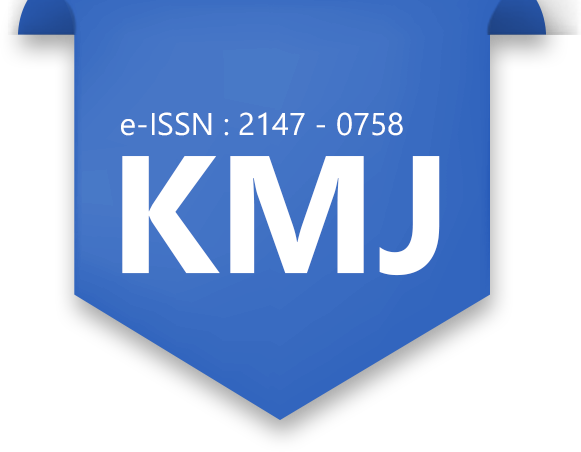
Comparison of Preoperative Acetaminophen, Deksketoprofen Trometamol on Headache Treatment after Electroconvulsive Therapy
Onur Koyuncu1, Sedat Hakimoglu2, Fabio Rodriguez-Patarroyo3, Senem Urfalı2, Mehmet Hanifi Kokaçya4, Alparslan Turan31Department Of Outcomes Research, Anesthesiology Institute, Cleveland Clinic, Cleveland, Oh, United States Of America; Department Of Anesthesiology And Reanimation, Hatay Mustafa Kemal University, Hatay, Turkey2Department Of Anesthesiology And Reanimation, Hatay Mustafa Kemal University Medicine Faculty, Hatay
3Department Of Outcomes Research, Anesthesiology Institute, Cleveland Clinic, Cleveland, Oh, United States Of America; Department Of General Anesthesia, Anesthesiology Institute, Cleveland Clinic, Cleveland, Oh, United States Of America
4Department Of Pschiatry, Hatay Mustafa Kemal University Medicine Faculty, Hatay,
INTRODUCTION: Electroconvulsive therapy (ECT) is an effective, life-saving treatment method with no significant side effects in the treatment of serious psychiatric disorders such as mania, schizophrenia, and acute catatonia. Headache is a serious complication seen with a high incidence (26-85%) after this treatment. Our hypothesis in the study is that pre-procedure administration of dexketoprofen trometamol will reduce headache more effectively than acetaminophen within six hours after ECT.
METHODS: In this prospective, double-blind, single-center study,we studied a total of 225 psychiatric patients aged 18 to 80 years having ECT.Before ECT, three analgesic strategies were (1) acetaminophen 1g / 100ml isotonic, (2) dexketoprofen trometamol 50mg / 100ml isotonic; and (3) 100 ml of placebo was administered intravenously.Headache intensity using VAS (Visual Analog Scale ), heart rate, noninvasive blood pressure, oxygen saturation, respiratory rate, sedation (Ramsey Sedation Scale), were evaluated at 2, 4 and 6 hours after the ECT. Analgesic requirements and side effects were recorded.
RESULTS: The most common diagnosis was depression (41%), followed by schizoaffective disorder (38%), and obsessive compulsive disorder (21%). No difference was found between groups in the headache VAS scores at 2 and 4 hours but patients who received dexketoprofen-trometamol have persistent headache at 6 hours after the procedure. At the 4th hour, 11% of patients in placebo group required rescue analgesia compared to the other two groups (p = 0,000).
DISCUSSION AND CONCLUSION: We found no clinically significant difference between the efficacy of dexketoprofen, acetaminophen, and placebo for reducing headache within the six-hour period after the ECT procedure.
Keywords: Acetaminophen, Deksketoprofen trometamol, Electroconvulsive Therapy
Elektrokonvülsif Terapi Sonrası Görülen Baş Ağrısı Tedavisinde Preoperatif Asetaminofen, Deksketoprofen Trometamolün Karşılaştırılması
Onur Koyuncu1, Sedat Hakimoglu2, Fabio Rodriguez-Patarroyo3, Senem Urfalı2, Mehmet Hanifi Kokaçya4, Alparslan Turan31Outcomes Research Bölümü, Anesteziyoloji Enstitüsü, Cleveland Clinic, Cleveland, Oh, Amerika Birleşik Devletleri; Hatay Mustafa Kemal Üniversitesi Tıp Fakültesi, Anesteziyoloji ve Reanimasyon Bölümü, Hatay2Hatay Mustafa Kemal Üniversitesi Tıp Fakültesi, Anesteziyoloji ve Reanimasyon Bölümü, Hatay, Türkiye
3Outcomes Research Bölümü, Anesteziyoloji Enstitüsü, Cleveland Clinic, Cleveland, Oh, Amerika Birleşik Devletleri; Cleveland Clinic, Anesteziyoloji Enstitüsü, Genel Anestezi Bölümü, Cleveland, Oh, Amerika Birleşik Devletleri
4Hatay Mustafa Kemal Üniversitesi Tıp Fakültesi, Psikiyatri Bölümü, Hatay, Türkiye
GİRİŞ ve AMAÇ: Elektrokonvülsif tedavi (EKT); mani, şizofreni, akut katatoni gibi ciddi psikiyatrik bozuklukların tedavisinde etkili, hayat kurtarıcı ve belirgin yan etkisi olmayan bir tedavi yöntemidir.Baş ağrısı, bu tedavi sonrası yüksek insidansla (%26-85) görülen ciddi bir komplikasyonudur.Bu çalışmada hipotezimiz,işlem öncesi deksketoprofen trometamol uygulamasının EKT sonrası altı saat içinde baş ağrısını asetaminofenden daha etkili bir şekilde azaltacağı yönündedir.
YÖNTEM ve GEREÇLER: Bu prospektif, çift kör, tek merkezli çalışmada, elektrokonvülsif tedavi uygulanan 18 ila 80 yaş arası toplam 225 psikiyatrik hastayı inceledik.EKT'den önce üç analjezik stratejisi (1) asetaminofen 1g / 100ml izotonik, (2) deksketoprofen trometamol 50mg / 100ml izotonik; ve (3) 100 ml plasebo intravenöz olarak uygulandı.Baş ağrısı şiddeti; VAS (Vizüel Analog Skalası), kalp hızı, noninvaziv kan basıncı, oksijen saturasyonu, solunum hızı, sedasyon (Ramsey Sedasyon Skalası) kullanılarak EKT'den 2 saat 4 saat ve 6 saat sonra değerlendirildi. Analjezik gereksinimleri ve yan etkiler kaydedildi.
BULGULAR: En sık tanı depresyon (% 41), ardından şizoaffektif bozukluk (% 38) ve obsesif kompulsif bozukluk (% 21) idi.Baş ağrısı VAS skorları 2 ve 4 saatte gruplar arasında fark bulunmadı, ancak deksketoprofen-trometamol alan hastalarda işlemden 6 saat sonra baş ağrısı devam etti.
Dördüncü saatte, plasebo grubundaki hastaların % 11'ine diğer iki gruba kıyasla kurtarma analjezi gerekti (p = 0,000).
TARTIŞMA ve SONUÇ: EKT prosedürü sonrası altı saatlik dönem içinde baş ağrısını azaltmak için deksketoprofen, asetaminofen ve plasebonun etkinliği arasında klinik olarak önemli bir fark bulamadık.
Anahtar Kelimeler: Asetaminofen, Deksketoprofen trometamol, Elektrokonvülsif Terapi
Manuscript Language: English












